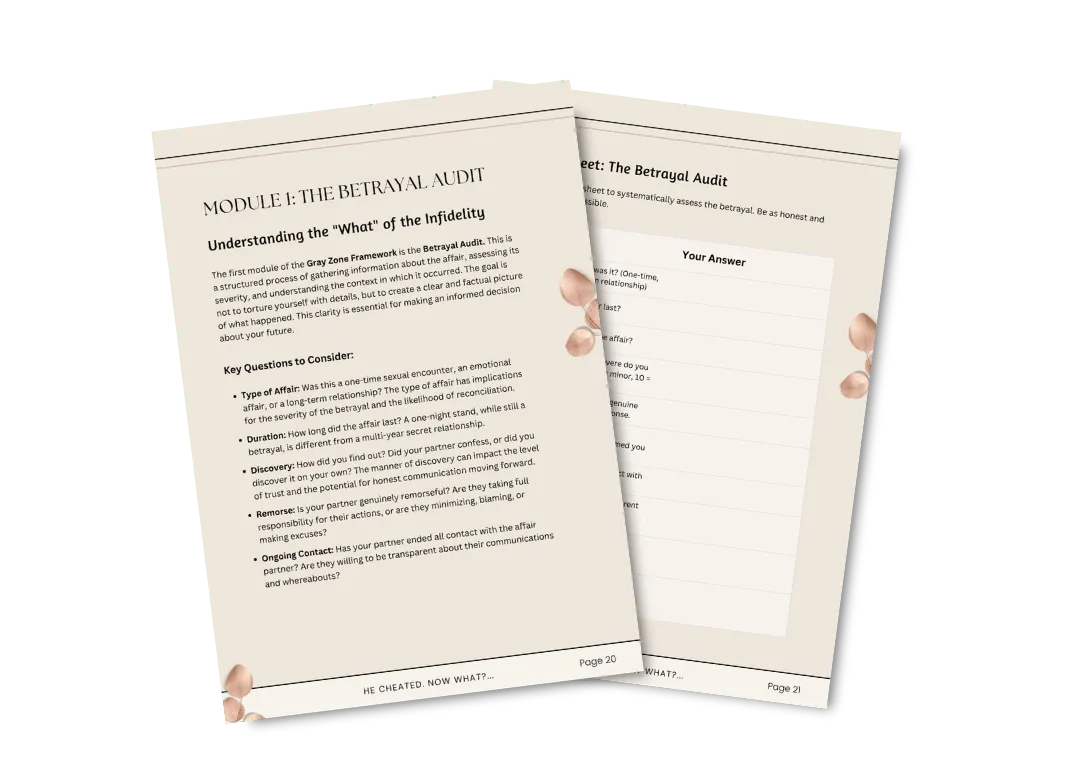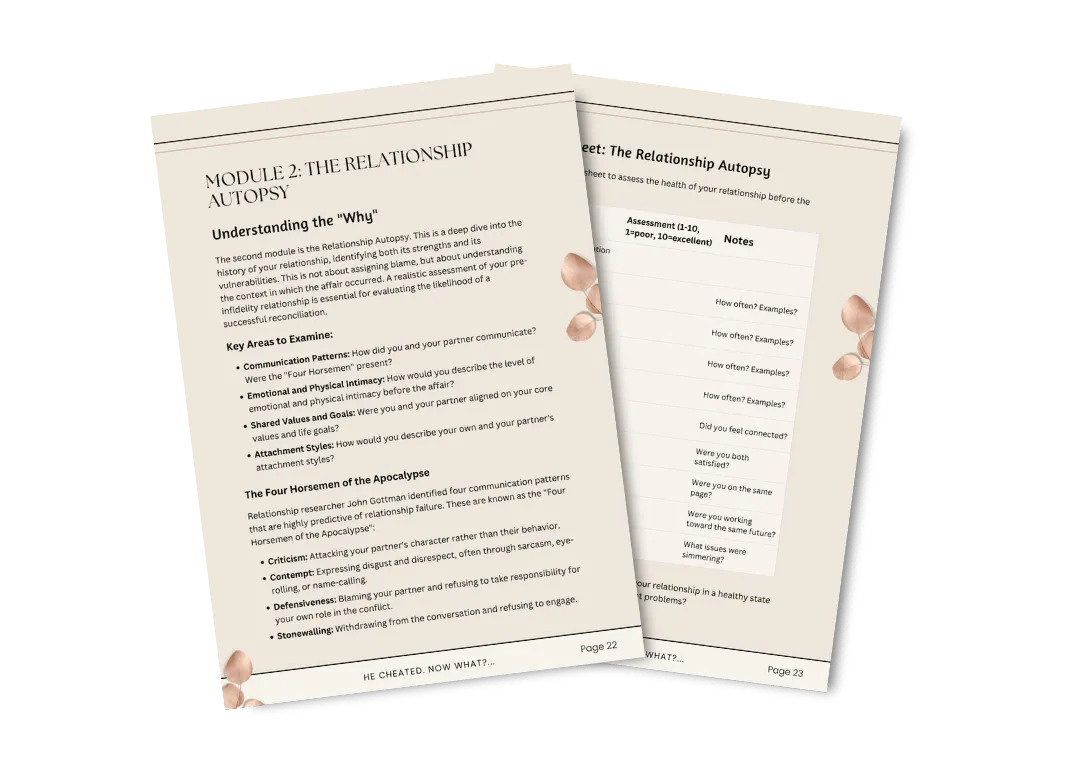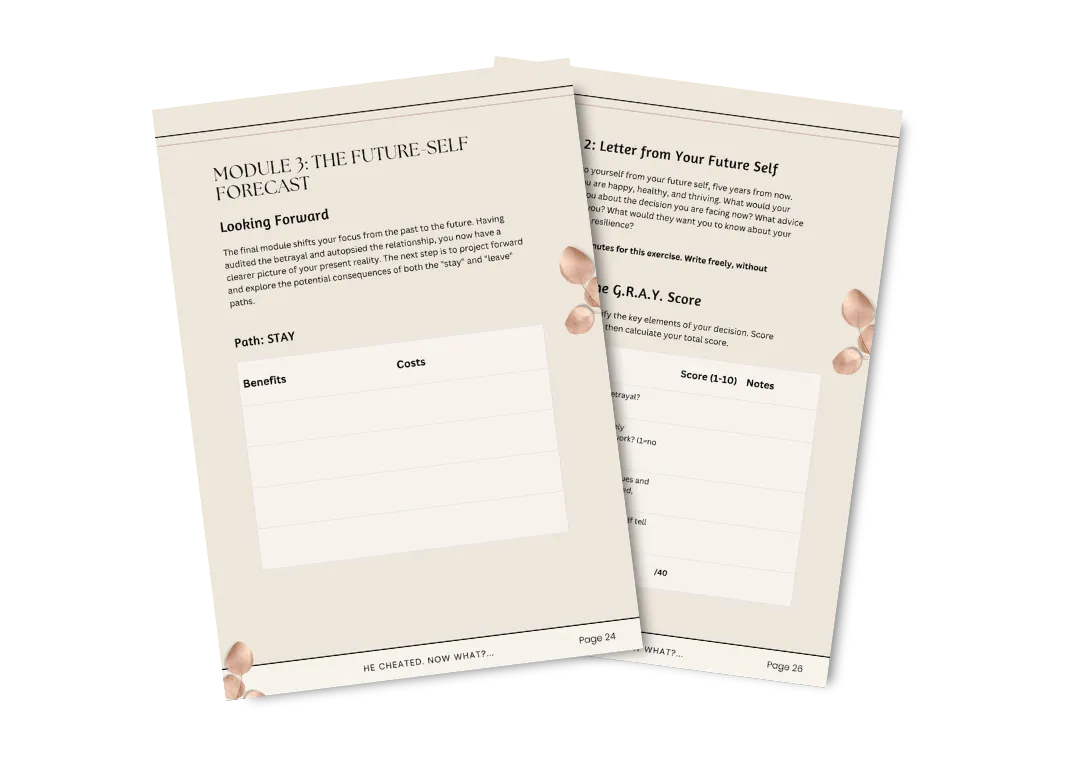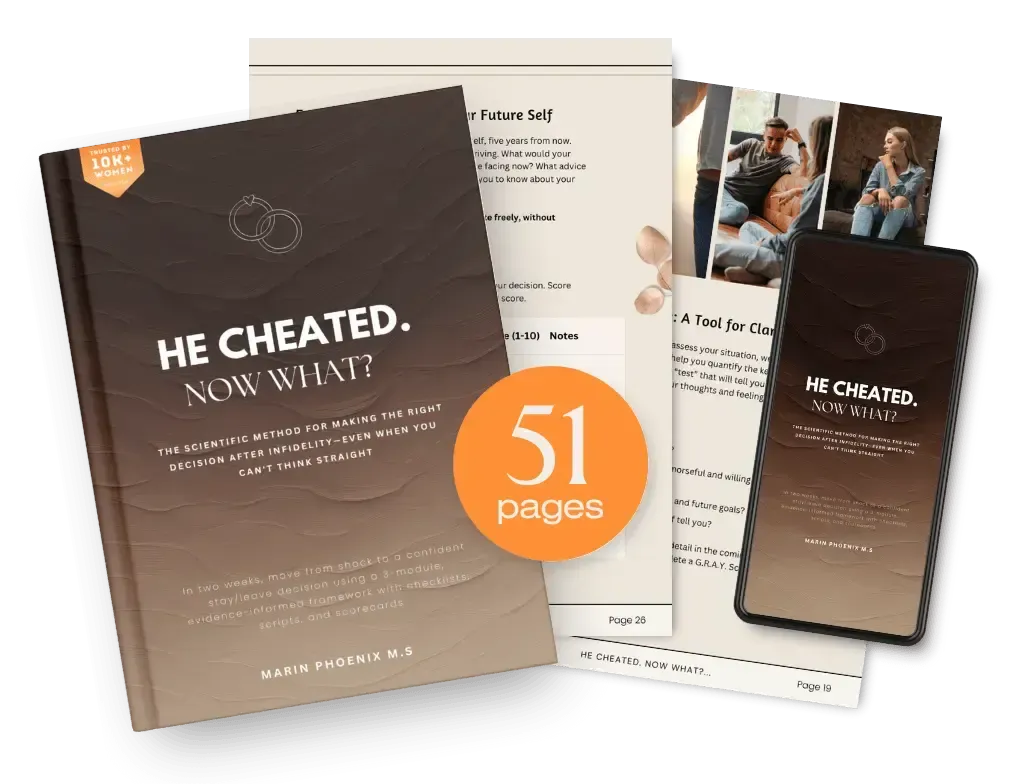

Whether it's been two weeks or two years, the endless indecision has a single purpose:
to steal your time.
Watch this short video to discover the 3-step system to find clarity and reclaim your future.
Instant digital delivery • 14‑Day Money‑Back Guarantee
As Seen On


If you're reading this, your world has been turned upside down
The ground has given way. The discovery of a partner's infidelity is a uniquely disorienting and traumatic event, one that shatters your sense of reality. You're left suspended in a state of profound uncertainty, a place we call the "gray zone."
It's a period of intense emotional turmoil and cognitive dissonance where the path forward is anything but clear. Your mind is racing with questions, intrusive thoughts, and a constant, looping replay of the betrayal.
It's not just "heartbreak."
It's trauma
What you are experiencing is not an overreaction. A growing body of research confirms that the experience of partner infidelity can trigger symptoms consistent with Post‑Traumatic Stress Disorder (PTSD). This is a profound violation of your attachment bond, a form of trauma that attacks your core assumptions about safety, love, and your primary relationship.

"I thought I was going crazy..."
“I thought I was going crazy. The book's explanation of PTSD and decision paralysis made me feel seen and understood.
Following the modules, I was able to move past the paralysis and make a choice that was right for me and my kids.”
– Emily R.

Should you stay or leave after infidelity?
Get clarity in 2 weeks (not 2 years)
A trauma-informed framework that turns emotional chaos into confident decision-making

Brain Fog
The inability to think clearly, make decisions, or even remember simple things. Your brain isn't broken; it's overloaded by trauma.

Hypervigilant
You're constantly on edge, scanning for more signs of betrayal, unable to rest or feel safe.

Shattered Self-Esteem
The betrayal didn't just break your trust in him; it shattered your trust in yourself. The constant question of 'How did I not know?' has destroyed your confidence in your own judgment.
You don't need months of therapy to find clarity. You need a structured system designed for people in crisis—starting today
🔒 Instant digital delivery • 14‑Day Money‑Back Guarantee
Every day spent in this Gray Zone is another day of suffering
You deserve a path forward. You deserve to reclaim your agency in a situation that has made you feel powerless.
Introducing He Cheated. Now What?:
A data‑driven way through infidelity
This isn't another book that tells you whether to stay or go. This is a structured, evidence‑based system designed to give you the tools to make that decision for yourself—with confidence and self‑awareness, even if you've been stuck in this gray zone for years.
We provide a clear, compassionate, and research‑backed framework that moves you from the initial shock to a firm, grounded decision in just two weeks. No judgment. No bias. Just a clear path to your own answer.

How it works: The 3‑Module Framework
We guide you through a 3‑module, evidence‑informed process using checklists, scripts,
and scorecards to bring clarity to the chaos.

1. The betrayal inventory
First, we assess the damage. This module provides a structured process for gathering the necessary information about the affair. You'll learn what to ask, when to ask, and what to avoid, using our Disclosure Protocol Scripts to prevent re‑traumatization and bypass the 'trickle truth' that causes so much pain.


2. The relationship autopsy
Next, we understand the "why." This involves a deep, honest look into the history of your relationship, identifying both its strengths and its vulnerabilities. Using tools like the ‘Four Horsemen’ checklist, you'll assess the health of your communication and connection, providing a clear‑eyed view of the relationship's foundation.


3. The future‑self forecast
Finally, we look forward. This module is about projecting two potential futures. You'll use our scorecards and exercises to realistically evaluate your partner's capacity for change and what a rebuilt relationship would look like, versus what a new life apart would entail. This isn't about fantasy; it's about making a choice based on the most likely reality.



1. The betrayal inventory
First, we assess the damage. This module provides a structured process for gathering the necessary information about the affair. You'll learn what to ask, when to ask, and what to avoid, using our Disclosure Protocol Scripts to prevent re‑traumatization and bypass the 'trickle truth' that causes so much pain.

2. The relationship autopsy
Next, we understand the "why." This involves a deep, honest look into the history of your relationship, identifying both its strengths and its vulnerabilities. Using tools like the ‘Four Horsemen’ checklist, you'll assess the health of your communication and connection, providing a clear‑eyed view of the relationship's foundation.

3. The future‑self forecast
Finally, we look forward. This module is about projecting two potential futures. You'll use our scorecards and exercises to realistically evaluate your partner's capacity for change and what a rebuilt relationship would look like, versus what a new life apart would entail. This isn't about fantasy; it's about making a choice based on the most likely reality.
🔒 Instant digital delivery • 14‑Day Money‑Back Guarantee
Everything you need to find your answer

The Bad Day First-Aid Kit
A 5-Step emergency protocol for 'when the trauma hits'. This isn't a chapter of theory. This is an emergency protocol.

A 7‑day stabilization plan
Create physical and emotional space, find professional help, and secure your footing.

Disclosure protocol scripts
Have the 'talk' in a structured way that minimizes harm and gets you the information you actually need.

The 'Four Horsemen' relationship checklist
Objectively assess the health of your communication patterns, based on decades of research.

Red flag & green flag scorecards
Evaluate your partner's words and actions to determine if they are truly capable of rebuilding trust.

The future‑self projection worksheets
Visualize and weigh the potential outcomes of both staying and leaving.

"The 'Tell Me Everything' fallacy..."
“The 'Tell Me Everything' fallacy was a huge eye‑opener. I was causing myself so much pain by demanding details I wasn't ready for. The scripts helped my husband and I have the first productive conversation we'd had since D‑day.”
– Sarah P.

🔒 Instant digital delivery • 14‑Day Money‑Back Guarantee
TRY IT RISK FREE
A trauma‑informed approach, backed by science
This framework isn't based on opinions or pop psychology. It's built on the foundational principles of trauma‑informed care and cites research from credible sources like the Journal of Social and Personal Relationships.


"I was completely lost..."
“I was completely lost. My mind was a mess of anger, pain, and a million questions. This book was a lifeline.
The framework didn't give me the answer, it helped me find my own. For the first time in months, I feel at peace with my decision.”
– Jessica M.

🔒 Instant digital delivery • 14‑Day Money‑Back Guarantee
What you'll have in 2 weeks:

✅ A clear, documented decision you feel confident about
✅ Freedom from the mental torture of 'what if' scenarios
✅ Scripts you've actually used to have productive conversations
discover the difference
Is this guide right for you?

This guide IS for you if:
You're living in the aftermath of a partner's infidelity, whether it was discovered yesterday or years ago
You're stuck in the 'gray zone,' unable to decide whether to stay or leave
You're experiencing trauma symptoms: intrusive thoughts, hypervigilance, emotional whiplash
You want a rational, structured process rather than relying on chaotic emotions
You're ready to do the hard work of honest self‑reflection
You're tired of well-meaning but unhelpful advice from friends, family, or even therapists who don't specialize in betrayal trauma

This guide is NOT for you if:
You're looking for a magic wand to fix your relationship or erase the pain
You want someone to tell you what to do (this empowers YOUR choice)
You're unwilling to engage in honest self‑reflection
Find your clarity today
Your journey out of the gray zone starts now. For the price of a single therapy co‑pay, you can have the complete, evidence‑based framework to guide you toward a confident decision and a future with peace of mind.

Here's Everything You Get Today:
The "He Cheated. Now What?" Guide (Value: $49)
The G.R.A.Y. Score Worksheet (Value: $27)
The 'Four Horsemen' Checklist (Value: $22)
Disclosure Protocol Scripts (Value: $35)
BONUS: Red/Green Flag Scorecards (Value: $19)
Total Value: $152 Today's Price: Just $19
$19
One‑time payment • Instant digital delivery
GET YOUR GUIDE TO CLARITY NOW

🛡️Our 14‑Day Clarity Guarantee
We are confident this framework will provide you with a clear, structured path to a decision. If you complete the exercises and don’t feel you have more clarity and confidence in your path forward, simply email us within 14 days for a full, prompt, and courteous refund. You either find the clarity you're looking for, or you pay nothing. It's that simple.
Instant Digital Delivery • 14‑Day Money‑Back Guarantee • Secure Payment
Frequently Asked Questions
I've been dealing with this for years. Is it too late for me?
Absolutely not. This guide is designed specifically for you. The framework helps you audit your 'new reality' and provides tools to process long-term trauma, not just the initial shock. It's never too late to reclaim your peace of mind.
We tried couples counseling and it didn't work. How is this different?
This is not couples counseling. This is a personal toolkit for YOU. Unlike therapy that may focus on 'fixing the relationship' or what you did wrong, this framework focuses entirely on empowering you with a logical process to find your own clarity and rebuild your self-trust.
Will this book tell me whether I should stay or leave?
No. Its purpose is to empower you to make your own decision with clarity and confidence. It provides the framework; you are in the driver's seat.
Is this based on real science?
Yes. It is grounded in trauma psychology, attachment theory, and decision science, and references peer‑reviewed research.
What if my partner won't participate?
Partner participation can help, but the core work is for YOU. It is designed to help you find clarity regardless of your partner's willingness to engage.
I feel too overwhelmed to even start. Will this be too much?
The guide is designed specifically for people in overwhelm. The Quick‑Start and 7‑Day Stabilization Plan are gentle first steps before deeper work.
How is this different from other relationship books?
It's a specialized, trauma‑informed crisis tool focused on one thing: helping you make the stay‑or‑leave decision effectively and confidently.
How is this different from free advice online?
Emphasize the structured, trauma-informed approach vs. random forum opinions.
You can stay stuck in the gray zone, or you can choose a path to clarity.
You've suffered enough. The endless cycle of questions, the sleepless nights, the emotional exhaustion—it doesn't have to be your reality. A clear, confident decision is possible, and the path to it is right here. In two weeks, you can be out of the paralysis and on a firm path forward, with peace in your decision.
🔒 Instant digital delivery • 14‑Day Money‑Back Guarantee
